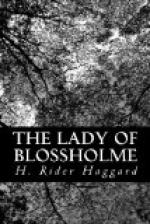Father Roger, the old clerk still holding the lantern behind him, writing something in a little vellum book, asking her the date of her birth and her full name, which, as he had been present at her christening, she thought strange. Then her husband signed the book, using the altar as a table, not very easily for he was no great scholar, and she signed also in her maiden name for the last time, and the priest signed, and at his bidding Emlyn Stower, who could write well, signed too. Next, as though by an afterthought, Father Roger called several of the congregation, who rather unwillingly made their marks as witnesses. While they did so he explained to them that, as the circumstances were uncommon, it was well that there should be evidence, and that he intended to send copies of this entry to sundry dignities, not forgetting the holy Father at Rome.
On learning this they appeared to be sorry that they had anything to do with the matter, and one and all of them melted into the darkness of the nave and out of Cicely’s mind.
So it was done at last.
Father Necton blew on his little book till the ink was dry, then hid it away in his robe. The old clerk, having pocketed a handsome fee from Christopher, lit the pair down the nave to the porch, where he locked the oaken door behind them, extinguished his lantern and trudged off through the snow to the ale-house, there to discuss these nuptials and hot beer. Escorted by their torch-bearers Cicely and Christopher walked silently arm-in-arm back to the Towers, whither Emlyn, after embracing the bride, had already gone on ahead. So having added one more ceremony to its countless record, perhaps the strangest of them all, the ancient church behind them grew silent as the dead within its graves.
The Towers reached, the new-wed pair, with Father Roger and Emlyn, sat down to the best meal that could be prepared for them at such short notice; a very curious wedding feast. Still, though the company was so small it did not lack for heartiness, since the old clergyman proposed their health in a speech full of Latin words which they did not understand, and every member of the household who had assembled to hear him drank to it in cups of wine. This done, the beautiful bride, now blushing and now pale, was led away to the best chamber, which had been hastily prepared for her. But Emlyn remained behind a while, for she had words to speak.
“Sir Christopher,” she said, “you are fast wed to the sweetest lady that ever sun or moon shone on, and in that may hold yourself a lucky man. Yet such deep joys seldom come without their pain, and I think that this is near at hand. There are those who will envy you your fortune, Sir Christopher.”
“Yet they cannot change it, Emlyn,” he answered anxiously. “The knot that was tied to-night may not be unloosed.”
“Never,” broke in Father Roger. “Though the suddenness and the circumstances of it may be unusual, this marriage is a sacrament celebrated in the face of the world with the full consent of both parties and of the Holy Church. Moreover, before the dawn I’ll send the record of it to the bishop’s registry and elsewhere, that it may not be questioned in days to come, giving copies of the same to you and your lady’s foster-mother, who is her nearest friend at hand.”




